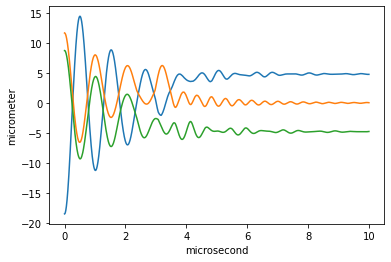python class which numerically solves ion equilibrium positions, normal modes, and motion in arbitrary potentials
It leverages two powerful libraries, pint and autograd to handle physical units and differentiation of native python functions.
Install using pip
pip install git+https://gitlab.phys.ethz.ch/graum/ion_simThen create your own class inheriting from IonSim, overload the potential function U(x, y, z, t) and you're off to the races!
from ion_sim import IonSim, init
import numpy as np
import matplotlib.pyplot as plt
import pint
from math import pi as π
class SimpleExample(IonSim):
def U(self, x, y, z, t):
m = self.m
ωx = 2*π * u('1 MHz')
ωy = 2*π * u('5 MHz')
ωz = 2*π * u('10 MHz')
Ux = (1/2) * m * ωx**2 * x**2
Uy = (1/2) * m * ωy**2 * y**2
Uz = (1/2) * m * ωz**2 * z**2
return (Ux + Uy + Uz).to_base_units().m
example = SimpleExample(u)
# create 3 ions with mass 40 amu (Ca+)
example.m = u('40 amu') * np.ones(3)
# add motional dissipation
example.gamma = u('1 MHz')
# set initial conditions
example.x0 = init.gaussian(example, sigma=np.array([10, 10, 10]) * u('um'))
example.v0 = init.thermal(example, T=u('1 mK'))
t = np.linspace(0, 10, 10000) * u('us')
example.run(t)
plt.plot(t,example.x[0,:,:].T)